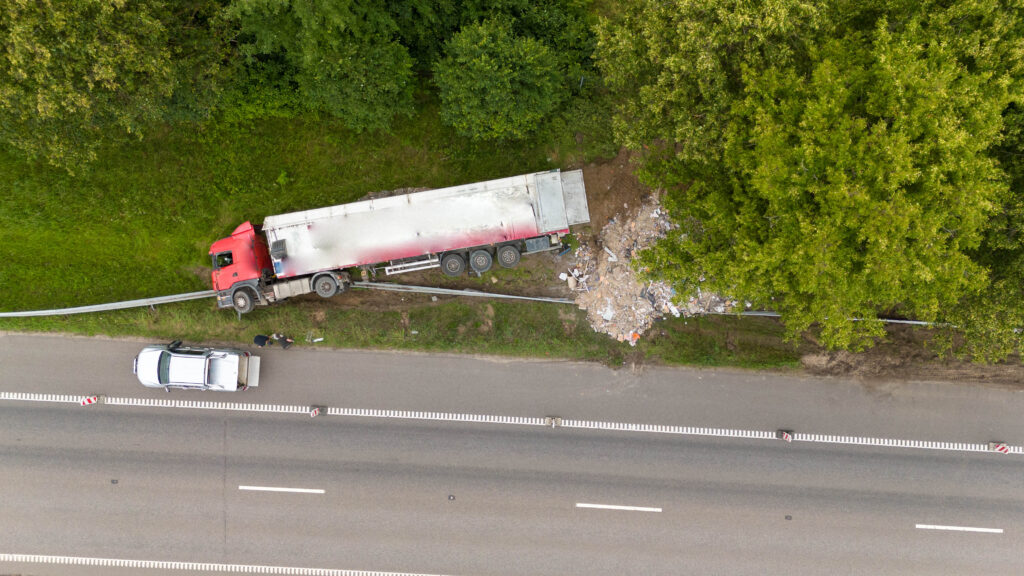Raleigh, NC: (919) 277-9299

The aftermath of a commercial vehicle accident can be overwhelming when the other party is a semi-truck driver.
Considerations for filing a trucking accident lawsuit against an out-of-state carrier include the legal jurisdiction, summoning the driver or carrier, and identifying faults in compliance, which sometimes make these lawsuits difficult to pursue. But having an experienced legal team on your side can help!
When you’re ready to take legal action, let the attorneys at Bell Legal Group help with these challenges:
Establishing Jurisdiction in South Carolina
If a semi-truck driver’s actions cause an accident in which you or a loved one is harmed, they may be liable in other states. But first, personal jurisdiction, meaning the defendant’s connections to a state, must be established. Doing this authorizes local courts to hear and decide the case, no matter where the truck operator or freight company is from. A carrier may try to deny they are subject to lawsuits due to having minimal contact within the state.
Law firms that handle commercial vehicle accidents understand how to prove the out-of-state trucking company satisfies South Carolina’s requirements for jurisdiction. Lawyers can request freight logbooks and historical company documents to show a company conducts regular business or makes repeated deliveries in South Carolina, establishing the carrier’s jurisdiction.
Legal Filings Against Out-of-State Defendants
Legal filings must be filed correctly and within certain deadlines. You generally have three years to file a lawsuit against a freight company or commercial driver in South Carolina, but several factors can influence this timeline. It’s best to consult with an attorney to understand the stipulations before filing.
There are also extra challenges to summoning someone from out of state. These logistics are other tasks an attorney can assist with.
Regulations for Interstate Trucking
Every licensed driver operating in South Carolina must follow the state’s motor vehicle laws, but interstate semi-truck drivers must also comply with federal regulations. Though commercial drivers and freight companies are trained on federal requirements for properly operating, inspecting, and insuring commercial vehicles, they don’t always toe the line. When lapses in judgment, restrictive transport schedules, or other influences instigate violations that lead to accidents, those harmed have the right to hold trucking parties liable.
Attorneys will investigate freight company logs, electronic tracking devices, and driving records to collect evidence to strengthen your case against out-of-state truck drivers and freight companies.
Interstate truck drivers may fail compliance in these areas:
Commercial Driving Requirements
Interstate truck drivers must be at least 21 years old and have met the requirements for a commercial driver’s license (CDL) in their home state. The CDL must also be designated for interstate travel, which requires the operator to possess a USDOT number for certain weights or loads. When a crash occurs, a driver who does not meet these commercial driving requirements can be liable for ignoring them, and the freight company can face consequences for deploying an ineligible or unqualified operator.
Operating Authority
Every state, including South Carolina, observes motor vehicle laws regarding operating authority. Trucking companies must establish this through the Federal Motor Carrier Safety Administration (FMCSA), which legally permits commercial operation. Examples of operating authority violations include:
- Driving without a valid CDL
- Exceeding vehicle weight or load limits
- Improper permitting for hazardous materials
- Ignoring hours of service requirements
- Operating an improperly maintained, unsafe vehicle
Negligent operation is a significant legal implication for interstate semi-truck drivers violating these requirements. An unauthorized driver can face serious consequences and license revocation, and the trucking company may be held liable for any harm caused by an accident.
Insurance Coverage for Interstate Travel
South Carolina’s Public Service Commission (PSC) oversees intrastate commercial transport and sets limits for liability insurance. When a trucker crosses state lines, the FMCSA coverage minimums apply, which can be up to 25 times those of intrastate requirements. Coverage varies based on the type of goods in the load, the carrier weight, and whether the carrier is private or for hire. Not all freight carriers adhere to these minimums, and for-hire operators may try to skirt insurance requirements to cut operating costs.
South Carolina motor vehicle laws require drivers to carry uninsured motorist (UIM) coverage, which can protect policyholders injured in crashes with inadequately insured drivers, including interstate semi-truck operators. But collisions with box trucks or 18-wheelers cause substantial damage and injuries that may exceed insurance limits. You may need to take legal action to recover additional damages UIM coverage may not recognize, including pain and suffering.
Commercial vehicle laws for interstate travel can be difficult to understand and violations are challenging to prove. Don’t let that stop you from holding a negligent out-of-state trucker or freight carrier responsible for an accident. You have the right to pursue legal action. Contact Bell Legal Group to discuss your recovery options.
